Triangle of Sadness director breaks down the film's class satire and that wild vomiting scene

- Oops!Something went wrong.Please try again later.
- Oops!Something went wrong.Please try again later.
Warning: This article contains spoilers for Triangle of Sadness.
Very few directors in the history of cinema have won the prestigious Palme d'Or, the top prize at the Cannes Film Festival — and even fewer have done it twice. But with Triangle of Sadness, out this weekend in U.S. theaters after premiering at Cannes this summer, Swedish filmmaker Ruben Östlund has now joined that very exclusive group.
After breaking out with 2014's family-vacation-gone-wrong film Force Majeure, Östlund won his first Palme for 2017's The Square, an exploration of modern artists in a media world consumed with debates about political correctness and free speech. But Triangle of Sadness is his most raucous film yet. It starts with intimate arguments about money between a young, beautiful couple (Harris Dickinson and the late Charlbi Dean, both playing models), then follows them as they embark on a luxury cruise that goes wrong in all kinds of ways — first with the passengers and crew enduring a violent bout of seasickness, then with a shipwreck on a seemingly deserted island.
EW caught up with Östlund ahead of Triangle of Sadness' U.S. release to discuss fake vomit, the moment he realized he was going to win the Cannes prize again, and breakout star Dolly de Leon. Read on for an an edited version of the discussion.
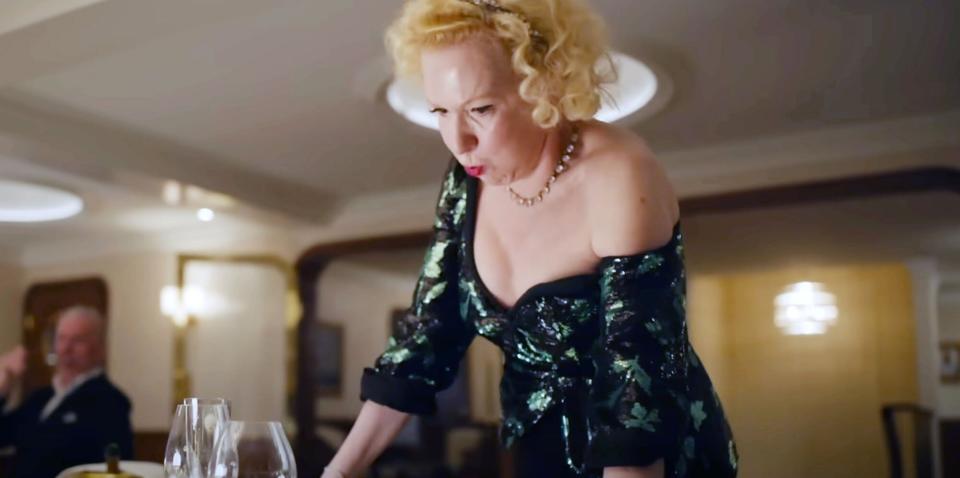
Everett Collection Sunnyi Melles in 'Triangle of Sadness.'
ENTERTAINMENT WEEKLY: I wanted to start by hitting the ground running: How did you approach filming the big vomiting scene where everybody's seasick on the ship?
RUBEN OSTLUND: First of all, we were filming on a set that actually could rock and move, so it turned out quite quickly when we were doing tests and looking for angles and so on that the crew actually got seasick. So some of the people in the crew had seasick pills and these bands around the wrist and so on to be able to work on the set for a whole day.
And then we were working with these tubes that went into the actors' mouths. You could push a button and then it comes out of the mouth of the actor without them really knowing when to expect it. They tried to keep their mouth shut and then it would just burst out. So we did a lot of trying out things that they could have in the mouth to make it look good. When the vomit comes out of the mouth, it looks a specific way, so it was hard to make that little opening of the pipe in the correct way and so on. We worked quite long on that.
Anyway, of course I was looking at the classic example from film history when it comes to throwing up: Monty Python's Life of Brian. I decided quite early on that the audience will probably understand we're going to do some vomiting here, so my decision was, "okay, then we have to push it ten times further than they can expect. Otherwise it's not going to end up being anything."
But then we had one actress, Sunnyi Melles, who could provoke throw up by herself. It was so interesting to work with her because I've never seen any actress have such physical control over their body and also willing to go as far as she did, when she was sliding around on the floor and so on. She was amazing.
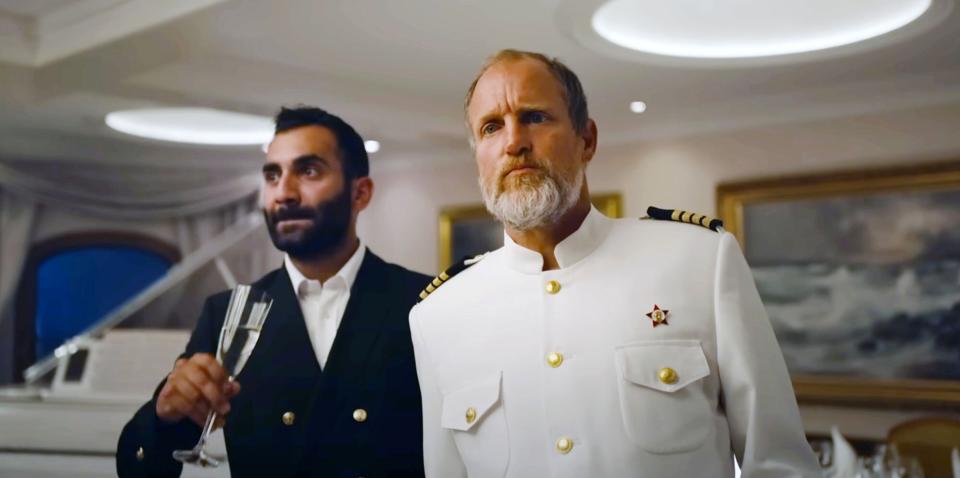
Everett Collection Woody Harrelson plays a communist yacht captain in 'Triangle of Sadness.'
It's very amusing that all the vomiting is set against this conversation between Woody Harrelson's captain and the Russian billionaire Dimitry (Zlatko Burić), who are throwing classic quotes at each other from Marx and Lenin vs. Thatcher and Reagan. What were you trying to communicate there? It felt almost like these old debates are just as silly as mass vomiting.
I was born in the '70s, and my feeling from growing up during the '80s and the '90s was that the world was always looking at itself from either a Western perspective or an Eastern perspective, these two ideologies that were bashing their heads against each other. My mother is one of the few that still calls herself a communist, so I was brought up in a family where we were discussing politics a lot and we were having a lot of arguments. It was really fun when we were talking politics, but my feeling has been that the left wing, in many ways, don't want to admit that there have been any advantages of market economy or capitalism. They don't want to see that capitalism actually has improved a lot of things for us.
But it's the the same thing with conservatives, they don't want to admit that socialism actually has made us take care of each other in a different way. So yeah, I wanted to point out that this is an old-fashioned discussion where we are almost two football teams, with the left wing and the right wing. Haven't we left that behind us? Can we talk about how to create a society that is not connected to this hooligan mentality?
Triangle of Sadness is your second film to win the Palme d'Or. How did that feel?
There was a specific moment when I started to realize, "we are going to win the Palme d'Or again." Because when you are in an award ceremony, you don't know if you're going to win something. There are rumors going around that we will get a prize, then prize after prize is handed out to other films and finally it's only one prize left and it's the Golden Palm and it's the second time I've been in that room. It was a second of emptiness, complete emptiness, where I just felt, "do I want to go through this again?"
Then, of course, we win the Golden Palm and I'm like, "Okay, I'm super happy for everybody, for the prestige and the honor of the prize, and the attention the film gets because of this." Then, slowly, after a couple of months you also start to realize, 'Okay, oh my God.' It's only 10 directors that have won the Golden Palm twice, and it's only two that won two in a row. And people are starting to compare you with these directors and then of course you get proud. But it was so interesting to have that second of emptiness, and then go, "Okay, yeah, I'm happy."
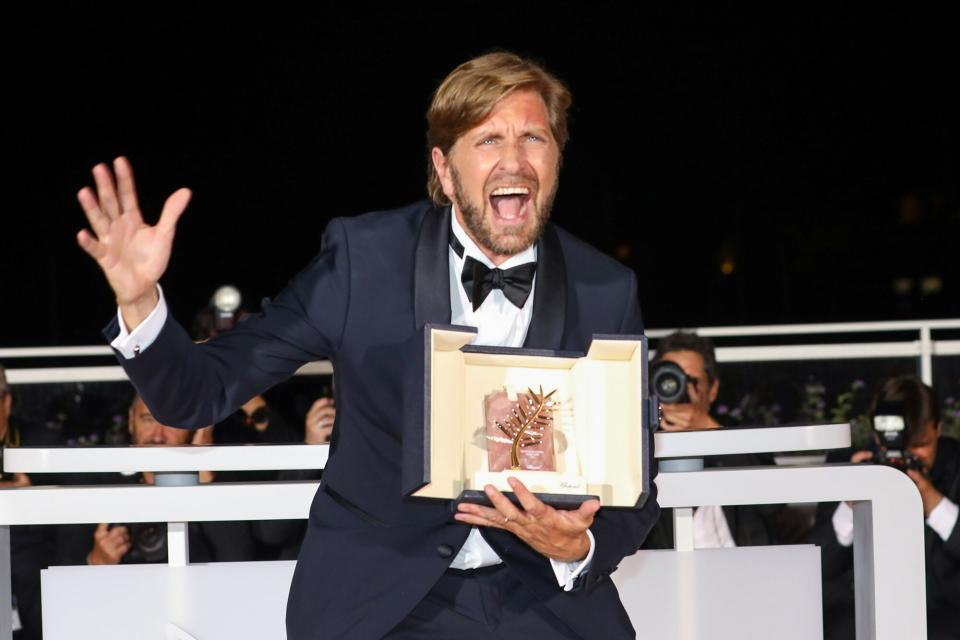
Stephane Cardinale - Corbis/Corbis via Getty Images Filmmaker Ruben Östlund won his second Palme d'Or for 'Triangle of Sadness.'
Were you surprised at all that this film specifically, with its scathing satire of class, would win such a big award from a fancy organization like Cannes?
Well, I think that it's a little bit about what kind of era cinema is in. I think that we've been longing for a cinema that brings in the audience and tries to do a wild entertaining roller coaster ride for the audience, even when it comes to quality movies, because I think a little bit like the art house cinema of Europe has become "we are dealing with important topics" where they always shoot the characters from behind. Those have become a genre of movie in itself. I think that the art of cinema has forgotten a little bit about the '70s and the '80s when we had [Luis] Buñuel and directors like that. They were completely fun even though they had a topic that was very important. And of course I have to mention also Adam McKay. With The Big Short and Don't Look Up, he has managed to do very political discussions that have been wildly entertaining at the same time. I think it's a great approach in order to get attention because having a topic that you think is important, you still have to fight to get attention.
Buñuel definitely feels like a major influence on your work. What kind of impact did his films have on you?
What really had an influence on me was the teachers and the mentors that I had from my film school. When they talked about Buñuel, they were so excited, and I got so excited by their energy. They helped me understand that his approach at that time was like, "Okay, do a film about a group of bourgeoisie elite trying to have dinner." It's like, how dare you? It's inspiring the way he really messes up with the way we describe the poor and the rich. We really love the portrayal of poor people as generous and nice and genuine, but he's just messing that up. I like the provocation that he has and his wild approach to content.
That really comes through in this film with Dolly de Leon's performance. What was it like working with her and watching her step up to take control of the film for that final act?
It was amazing because we shot the film almost chronologically. So I got to know basically everyone before we ended up on the island. Then it was time to get to know Dolly and also Jean-Christophe Folly, who plays the pirate. They came in like new actors on set. But I knew that Dolly was great at improvisation and taking command of a group when she goes, "one for you, one for me."
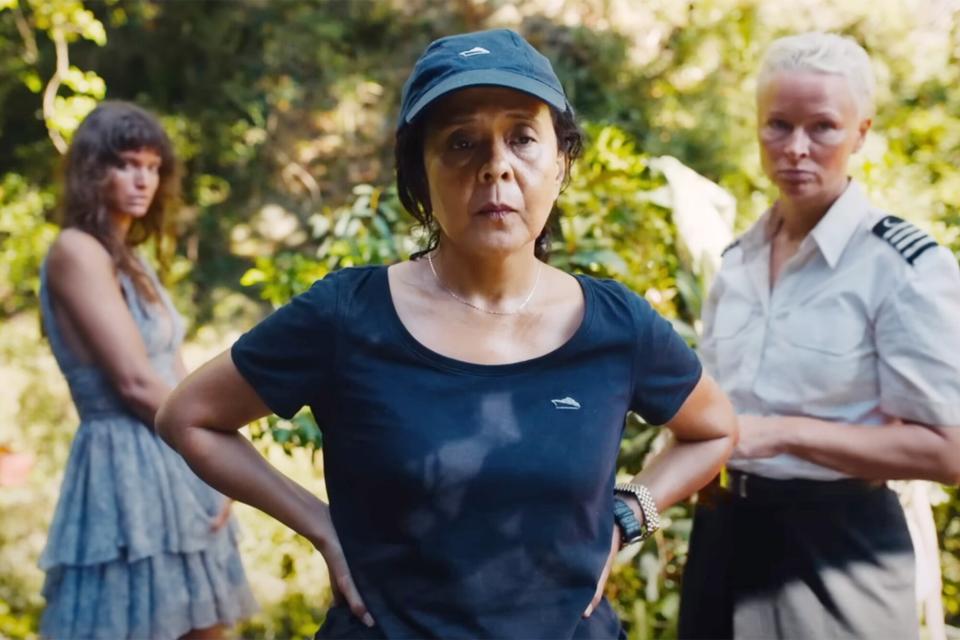
Neon/Everett Charlbi Dean, Dolly De Leon, and Vicki Berlin in 'Triangle of Sadness.'
My audience was dying at that part.
Okay, great! Because that was the first thing we were shooting when we got to Greece, where we shot the island stuff. You are always nervous when you are the director and you start to work with the actress that you have hopes that will reach another level. But as soon as we started to shoot that scene, I felt "I'm safe. She's going to do a great performance and she's going to make it believable that she actually takes command." It's tricky to build the bridge from the other ones being on top of the hierarchy to her pushing them down. It needs a very strong actress who knows how to manipulate the group. And so Dolly was just, from day one, when we started on the island, I was like, "Phew, I'm in safe hands."
I especially loved the ending and the ambiguous note that the film ends on. It feels like it's posing the question, now that she's in this position where she has this advantage over people, is she going to use it the same violent way that the rich people would? That reminded me of your other film Force Majeure, which involves a lot about people talking about, "Well, if I was in that situation, I wouldn't act like that." Is that something that you're generally interested in? Exploring how people react in these extreme situations?
Yeah, definitely. I've been inspired by Marx's theories that our behavior is very dependent on which position we have in a socioeconomic hierarchy. "If you go down here, your behavior will look in some way like this. And if you go up here, your behavior will look another way." Like, rich people don't like to pay taxes. They want to be philanthropists and there's a reason they are in this position.
Marx was one of the founders of sociology, and sociology is a beautiful topic because it doesn't put blame on the individual. It's all to trying to say, "Well, if you have this context and if the setup of a situation looks like this, you'll probably act in the same way." So it's basically taking away our guilt and shame and ethics and morals where we're trying to point to the individual and say, "you did wrong" or "you did right." Instead of that, it actually makes us take a step back, look at our behavior from a little bit of a distance, and help us understand ourselves.
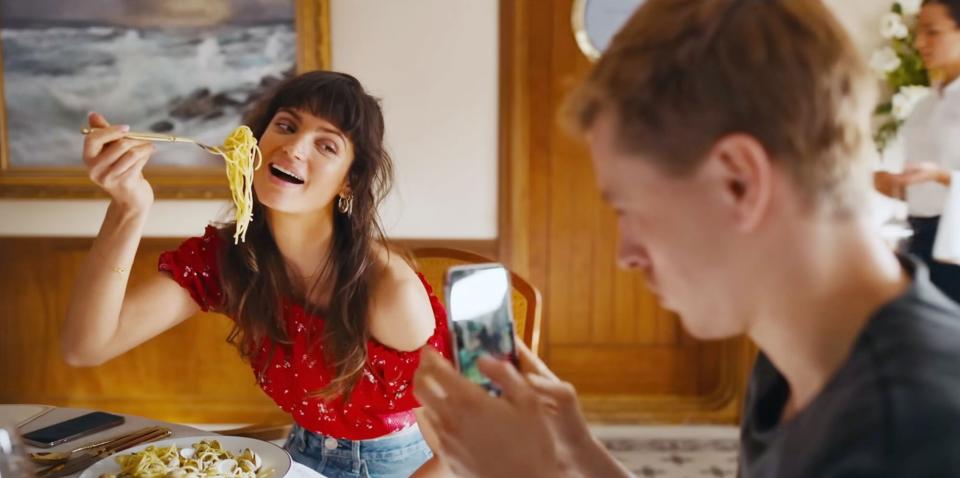
Everett Collection
It was so sad to lose Charlbi Dean after the completion of the film. What are you glad that people get to see from her in this movie, in her final performance?
First, one thing that was beautiful with the whole cast was that they were really working as a team and there was really no prestige between actors or anything. They were real team players, all of them. Charlbi was also a team player and she was really lifting everybody up. So when we went to Toronto and she was supposed to be next to us, that was a very absurd, sad feeling.
She was on her way, we don't know where she was going to end up. I think she was a great, great actress and she had a certain precise way of playing out the scenes. If you take a look at the bill scene in the beginning and the way she is with her body language, the way she says, "Wow, I'm reading," it's amazing. Or when Paula (Vicki Berlin) says something and she looks around in the room like, "Did you hear that?" She knew how to play around with the possible elements in a scene. So it really is a great opportunity to tell people to pay attention to her performance because she was very, very precise as an actress. She didn't need many takes. I do a lot of takes but she gave me very good results already from the beginning.
Related content:

